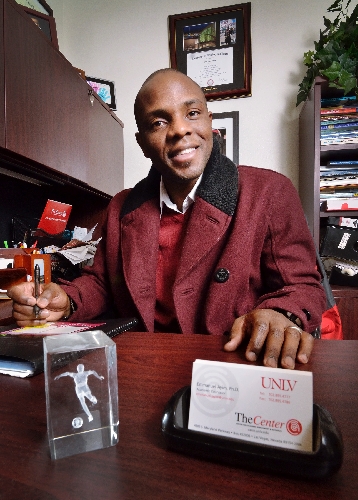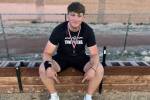Nevadan at Work: ‘Professor’ stresses goals on soccer field and life

When Emmanuel Ayim offers a soccer tip or life advice to his fellow players on the Las Vegas Legends professional soccer team, they listen intently. The 33-year-old university academic adviser and pro soccer player is affectionately known as "The Professor" on the Legends team.
Ayim is actually Dr. Ayim, an academic adviser at the University of Nevada, Las Vegas who earned his doctorate in sports education leadership in 2009. Ayim, who counsels 120 low-income and first-generation health science college students at UNLV, also keeps his soccer-playing juices flowing as a forward on the Legends indoor soccer team. Ayim, a UNLV academic counselor since 2009, has played for the Legends of the 19-team Professional Arena Soccer League since September.
Ayim commands respect on the Legends because he knows his biggest role is helping younger players understand that they need to prepare themselves for a career after the soccer balls stop flying. Ayim went through this himself nearly a decade ago.
His life’s turning point came between fall 2003 and spring 2004.
Ayim was a professional soccer player at the top of his game, playing forward for the San Diego Flash in a pro league that was one level below the top soccer league called Major League Soccer in the United States. But a new contract with a new team in Milwaukee fell through and then he bounced from pro soccer teams in San Diego to Indiana to Cincinnati.
Ayim, then 23, knew he was a good soccer player, a former national player for squads in the U.S. and his native Cameroon. But Ayim also knew that his not landing a long-term pro soccer contract meant that it was time to start a new academic path.
So in summer 2004, Ayim entered a masters program for sports administration at Grambling State, where his father worked as a health education professor. Ayim received his master’s in 2005 and then earned his doctorate at UNLV four years later.
Legends players and brothers Franck and Uzi Tayou are Cameroon natives who have learned much from Ayim about the importance of school.
"One of the things he always told me is to stay in school and always go to class," said Franck Tayou, 22, who attended the University of West Virginia. Patrick Lawrence, a Legends assistant coach and a Las Vegas police detective, said Ayim is both a veteran player and a role model for the younger players.
"He’s a model of attitude of leadership on and off the field. He personifies professionalism," said Lawrence, a former soccer player from Jamaica.
Ayim has credibility with younger players because he’s a former college, national and professional soccer player who understands the importance of balancing school and sports while also setting a career game plan.
"I understand the rigors of balancing school and traveling for sports," Ayim said. "The best teacher at times can be experience. I can relate to the student and give advice based on experience.
"For me when I played sports, sports was a release from the lectures, papers and exams. When you step on the field you exercise, run around and play soccer," he said. "When the game is over, you re-energize to study."
Ayim, who is married with an 8-month-old daughter and a 2½-year-old son in Henderson, enjoys playing for the hometown Legends, but he doubts he would leave Las Vegas for a different professional soccer team in another town.
"At this point it would be a poor financial decision to move out of Las Vegas. I bought a house. I have a secure job at UNLV," he said. "Sports is also like a gamble. You can be in the favor of one coach but three months later you can have a new coach and find yourself out of a job. There is uncertainty of if and when your next paycheck would come."
Question: On the Legends team, how do you get the younger players to buy into your advice?
Answer: On a team, respect is the biggest thing. They respect me as a soccer player and they have respect for what I have to say. They’re very receptive. Some of the guys are already thinking to an alternative plan in case soccer doesn’t work out. When you’re a professional soccer player, you have three to five years. When you retire you have to find something else to keep paying the bills.
Question: What impact did your parents have on valuing education?
Answer: From Day One, both my dad and mom preached education first. I have always been an athlete, but I knew education was the key.
Question: Did you ever consider dropping out at Dayton as an undergraduate to play pro soccer?
Answer: I didn’t even ask my mother because I knew it would be, "No." I had a discussion with my dad and it was a resounding, "No." My peers dropped out at the time and are just trying to catch up now and get their degree.
Question: Is the rest of your family academically oriented?
Answer: Yes. It was never a question that we would go to college. It was a question of what graduate degree will you get. My older sister is a surgeon in a private practice in Texas and my younger sister is an MBA doing consulting in New York.
Question: Do you think your teammates understand what it takes to get a doctorate?
Answer: I don’t go broadcasting my credentials. I’m sure most of my teammates don’t understand what it entails to get a Ph.D. But it doesn’t matter. Soccer is the undercurrent.
Question: You were a biology major at Dayton as an undergrad. How did you get to sports administration and sports education leadership in your graduate degrees?
Answer: I thought about psychology and even philosophy. But then I thought about something I (ask) students now, "What field are you most passionate and interested in and is it valuable to other people?"
Question: I know you coach kids. What is your coaching style like?
Answer: My coaching style is more introspective. I want kids to have fun and I think fun facilitates learning.
Question: How do you counsel students? Do you talk about everyday things? Long-range things?
Answer: Both, we talk about the micro and the macro big picture. We talk time management. We talk stress management. We talk about prioritizing things. We talk about being organized and having a planner. For an 18-year-old who never used a planner, college could be a daunting task. My biggest thing is to get them to complete what they start. My goal is to get them to graduate.
Contact reporter Alan Snel at asnel@reviewjournal.com or 702-387-5273.
VITAL STATISTICSName: Emmanuel Ayim
Age: 33
Occupation: Academic adviser, overseeing 120 low-income and first-generation college students at University of Nevada, Las Vegas and forward on the Las Vegas Legends indoor soccer team.
Quotable: "The best teacher at times can be experience. I can relate to the student and give advice based on experience."
Family: Married to Tawnya, school psychologist with Clark County schools, and father of 2 1/2-year-old son Emmanuel II and 8-month-old daughter, Gabrielle.
Education: University of Dayton, biology, 2000; Grambling State, master’s in sports administration, 2005; University of Nevada, Las Vegas, doctorate in sports education leadership, 2009.
Work history: University of Nevada, Las Vegas, academic adviser, 2009; also teaching Leadership class this semester at UNLV; San Diego Flash, pro soccer team, 2000-2001; Las Vegas Legends, August 2012 to present. Hobbies: Coaching soccer, reading 30 minutes before going to sleep, writing poetry, playing with kids, nature.
Favorite book: "Outliers" and "Purpose Driven Life"
Hometown: Henderson
In Las Vegas since: 2006
The Las Vegas Legends can be reached at (702) 888-0319 and lasvegaslegends.com


















